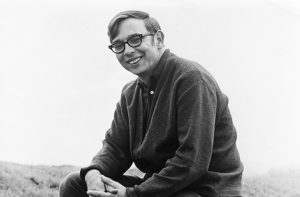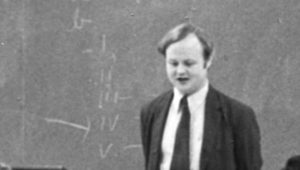R.C. Sproul

“The quest for the meaning of life was a troublesome problem for me from an early age. The ‘why’ questions were the ones that gripped my mind—not so much physical questions but metaphysical questions. Many children are fascinated by ‘how’ things work. They may even pester their parents with questions like, What makes a car run? How does a clock work? How does a seed turn into a flower? I had childhood friends like that, forever tinkering with cars and lawnmowers and skeletons. Some became engineers, some doctors, one a geologist and one a physicist. But I was bored with those questions. I knew they were very important questions, but they simply were not the ones on my mind.
“As a youth I had two consuming passions. One was sports and the other the ‘why’ questions. I saw no relationship between them at the time but in present reflection I think I can see how they fit together in my own circumstances.
….
“I wasn’t a Christian long until I had to face the question squarely: Was my conversion rooted in objective reality or was it merely an expression of my own subjective needs? I began to experience what Saint Augustine called, ‘Faith seeking understanding.’ Thus I turned my attention to the study of philosophy as my major academic pursuit.
“The study of the history of philosophy exposed me to virtually every serious alternative to Christianity the world has brought forth. I began to see the bankruptcy of secular world views. I found valuable insights in Spinoza, Kant, Sartre, and others. But no one seemed to have a consistent and coherent life and worldview.
“The philosophers themselves were their own best critics. Hume critiqued Locke; Kant critiqued Hume; Hegel critiqued Kant, and so on it went. There emerged no ‘sure results’ of speculative thought. The study of philosophy did provide very important tools for critical analysis which proved very helpful for my own pilgrimage. The more I studied philosophy the more intellectually credible and satisfying Christianity became.
“After college came seminary…From seminary I went on to a doctoral program in Europe. It was a difficult and exhilarating experience. Almost all of my work had to be done in foreign languages which required a new kind of intellectual discipline for me. Studying under G. C. Berkouwer of the Free University of Amsterdam exposed me to all the latest theories of theology and biblical studies. The European system exposed me to the method of approaching theology and biblical studies as a technical science. Studying the primary sources in original languages such as Dutch, German and Latin gave new tools for scholarship.
“From Europe I returned to America and began my teaching career. Teaching in both college and seminary, I had an unusual pattern of teaching assignments. At one college I taught almost exclusively in the field of philosophy. In another college I was responsible to teach theology and biblical studies. My first seminary appointment had me teaching philosophical theology which combined both philosophy and theology. Oddly enough I was also asked to teach New Testament theology. In an age of specialization I was forced into being a ‘generalist,’ working in several different but related fields.
“The science of apologetics which offers intellectual defense of the credibility of Christianity finally became my point of ‘specialty.’ That is usually what happens to generalists.
…
“The teaching arena has been the crucible of my thinking. The more I study and the more I teach and engage in dialogue with unbelievers and critics the more confident I have become in the rock-solid intellectual integrity and truth of Christianity. In fact, I am overwhelmed by the profundity, coherency, and intricate internal consistency of Christianity. I am awed by the majesty and brilliance, not to mention the power, of the Scriptures. Take away the Scriptures and you take away Christ. Take away the Christ and you take away life. My conviction is one with that of Luther: Spiritus Sanctus non scepticus: ‘The Holy Spirit is not a skeptic and the assertions He has given us are surer and more certain than sense and life itself.’
“I dream of a new reformation, a reformation that is not simply a renewal of life but a new vision of life: a vision that yields new forms and structures in society and culture. As long as Christians restrict their Christianity to a religion, a faith that is compartmentalized and isolated from life, they can have revival but never, ever reformation. We need to hear and do the Word of God in all of our lives.”
The prior selections were taken from his book “Reasons to Believe”
John Frame

“I majored in philosophy [at Princeton] and also took courses in religion, literature, and history. The religion courses, together with the denominational campus ministries, gave me my first introduction to theological liberalism.
“Although I had toyed with similar ideas during my high school years, I sharply rebelled against liberalism in college. Princeton liberalism was casual religion: no authoritative Bible, no passion for souls, no desire for holiness, no vitality. Indeed, the Christ of Scripture simply wasn’t there. Later, I read J. Gresham Machen’s Christianity and Liberalism, which argued that liberalism was an entirely different religion from Christianity, and I found it entirely persuasive. Although liberalism has changed its face in the years since, I still see it as the opposite of the biblical gospel.
….
“Other philosophy teachers gave me a good introduction to the history of philosophy….I was convinced that alongside other differences among philosophers (including factual differences), there were also ‘perspectival’ differences. That is to say, not all the differences between thinkers are differences between truth and falsity, right and wrong; factual disagreements; or differences between clear thinking and ‘mistakes.’ Some are also differences in perspective, looking at the same truth from different angles. That was the beginning of my inclination to understand reality ‘perspectivally.’
“So when I graduated from Princeton, I was biblically oriented (almost biblicistic, but I think in a good way), antiliberal, ecumenical, and incipiently perspectivalist.
….
“[At Westminster Seminary, Cornelius] Van Til became the greatest influence on my apologetics and theology….His message is precisely what people of our time need most to hear: that the lordship of Jesus Christ must govern our thoughts (2 Cor. 10:5) as well as every other area of life. Every problem of theology, apologetics, biblical studies, science, and philosophy takes on a very different appearance when we reject non-Christian presuppositions and seek to think consistently according to Christian ones.
….
“I [later] went to Yale for graduate study in philosophical theology. I earned both an MA and an MPhil there, but, alas, I did not finish my dissertation for the PhD.
….
“Among the church fathers, Athanasius is my favorite—a man persecuted for his faith, but courageous and steadfast, and right about so many things, so early. Augustine has certainly been important to me, particularly his Confessions, the City of God, and his earlier philosophical/epistemological work, such as Soliloquies and On the Teacher. His teaching on the Trinity is profound, and I think more scriptural than the rather facile ‘social Trinitarianism’ that has caught the imagination of many today. And so much more should be said about this wonderful, godly Christian teacher.
“Anselm of Canterbury has been a special interest of mine since my AB thesis on the ontological argument at Princeton. His Proslogium is a wonderful piece of theology: prayerful, presuppositional, remarkably fresh.
“I have spent many hours with Thomas Aquinas, and although I share some of the criticisms of him by Van Til and others, I think he did far more good than harm to the theology of his time, and I have been vastly impressed by his genius.
“Of course, Luther and Calvin have meant a great deal to me, as to all other Reformed theologians. My commendations of them could add nothing to their greatness and would only echo the praises of others in the Protestant tradition.
“The same should be said of Jonathan Edwards, a great philosopher and Reformed theologian who did a rare thing in our circles: he struck a proper balance between emotions and intellect.”
The prior selections were taken from John Frame’s biography on his website.

